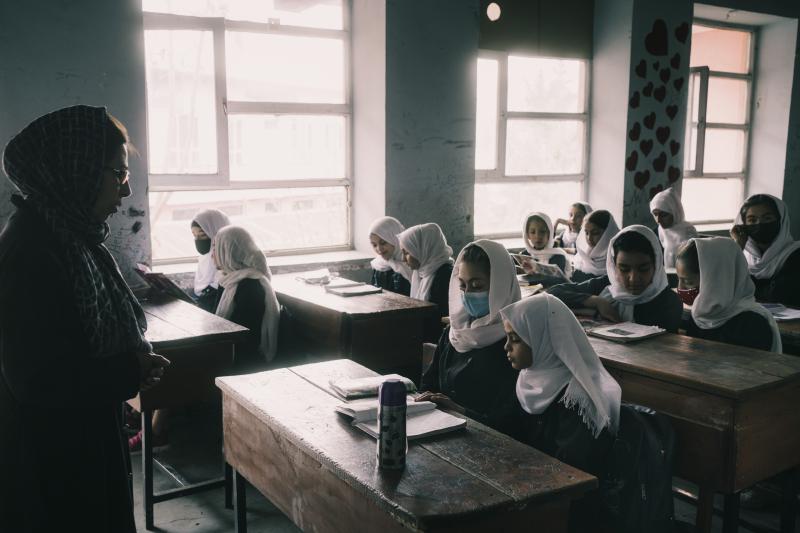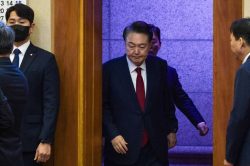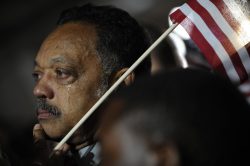
Students attend a class at Ayesha Durkhani girls school in Kabul on March 23. These students are in the sixth grade, the highest class the Taliban is allowing girls to attend.
18:04 JST, April 1, 2022
Outraged by a new Taliban decree banning some girls from school, and focused on the increasingly costly crisis in Ukraine, the international community faces a sharp dilemma: Should it continue the massive funding that has kept Afghans barely alive since last summer, or should it risk the starvation of a significant portion of the population to punish the militant government?
“I want to say as plainly as possible, please don’t make the people of Afghanistan suffer twice,” Martin Griffiths, the United Nations humanitarian affairs chief, appealed to a conference of donor countries Thursday. “Please don’t reduce assistance because of this wretched decision that we heard last week.”
Only 13 percent of this year’s $4.4 billion emergency humanitarian request for Afghanistan — the largest U.N. appeal ever for a single country — has been funded so far. The virtual conference, jointly hosted by Germany, Qatar and the United Kingdom, and attended by senior officials from dozens of countries, was long planned as a jolt to international donors to step up their efforts.
But their enthusiasm was undermined when girls above the sixth grade arriving for the first day of the Afghan school year last week were told to go back home indefinitely. The Taliban dictum reversed an announcement — demanded by and promised to donor countries — just days earlier that all schools for girls would be open. The change was variously attributed to a scarcity of female teachers, facility problems, delay in approving suitable school uniforms and what an Education Ministry spokesperson said were some “cultural and religious obligations” still under consideration.
A number of Afghan experts, however, blamed it on what they described as deep ideological schisms within the Taliban leadership related to basic rights for women and girls, among other things. The school announcement was followed by rulings limiting the travel of women outside the country, and reports that no passports would be issued until further notice.
Top Taliban leaders reportedly rejected the girls’ schooling decision after interventions from hard-liners during a meeting in Kandahar the weekend before the opening — and rapid closure — on March 23. But “there are also indications that the reversal is a symptom of the movement’s broader failure to create a clear mechanism for making national policy decisions,” Ashley Jackson, an Afghan scholar who has written extensively about the relationship between civilians and the Taliban insurgents, suggested in a report for the Afghanistan Analysts Network.
The Taliban did not have a blanket policy on female education in the territory the group controlled before taking over the whole of Afghanistan in August. In some provinces, there was not a single girls school in Taliban-controlled territory. In some other areas, local leadership allowed women to pursue higher education.
In remarks to the donors conference, Linda Thomas-Greenfield, the U.S. ambassador to the United Nations, called the decision “inexcusable” and said it “must be reversed.”
Donations for humanitarian assistance to Afghanistan had already slowed after a massive outpouring of aid last year following the Taliban takeover and U.S. troop withdrawal in August. The initial flow came as international aid organizations warned that the abrupt cutoff of foreign financing that had long provided more than 75 percent of Afghan government income would lead to mass unemployment and humanitarian catastrophe as the harsh winter approached.
The United States and most of the rest of the world provided donations for aid flows through the United Nations and other nongovernmental organizations, closely monitored so none of the food and medical supplies would go through the militants now in charge of the country. Diplomatic recognition and any direct assistance were withheld until the Taliban replaced what it said was a temporary governing structure that was more inclusive; ensured human rights for all, including women, girls and minorities; and eliminated any support for global terrorist groups.
Early this year, as it became clear that the lack of a banking structure and the absence of any cash income would lead to the collapse of infrastructure and services throughout the country, a U.N.-led effort was launched to pay salaries directly to health-care workers, teachers and other public-sector employees, and to develop at least a temporary financial system outside the reach of the Taliban to help stabilize the economy.
The World Bank agreed to release $1 billion from its Afghanistan development trust fund, which was frozen by bank member countries when the Taliban took over, to add liquidity to the banking sector. In February, President Biden signed an executive order to release $3.5 billion — about half of Afghan government assets held in the U.S. Federal Reserve that the administration had frozen — for the same purpose.
With no progress reported on an inclusive government, and little visible on the counterterrorism front, world attention turned to human rights, with the reopening of schools following Afghanistan’s traditional winter break seen as an opportunity for the militants to put actions behind their promises.
Within days after the Taliban about-face on education for girls, the United States canceled a round of U.S.-Taliban talks scheduled to take place this week in Doha, Qatar. The World Bank, expressing “deep concern,” said grants being prepared to spend part of the trust fund on “agriculture, education, health and livelihoods” would not be presented for approval until there is “a better understanding of the situation and assurance/confidence that the goals of the projects can be met.”
A State Department spokesperson, speaking on the condition of anonymity under government-imposed rules, said the administration was “still working to establish a mechanism to allow” the $3.5 billion covered by Biden’s executive order “to be used to help Afghans stabilize their economy.” But there was no indication that would happen soon.
During the Thursday donor conference, no one disputed the sorrow and deprivation being endured by Afghans. “Ninety-five percent do not have enough to eat,” U.N. Secretary General António Guterres said. “9 million are at risk of famine. . . . Global food prices are skyrocketing as a result of the war in Ukraine,” he said, and “without immediate action, we face a starvation and malnutrition crisis.”
Families are selling some of their children to feed the rest, Guterres said, more than 80 percent of the population is in debt, key workers have not been paid for months, farmers cannot buy feed or fertilizer, and “international aid agencies can barely function.” The international community, he said, “must find ways to spare the Afghan people. It must make cash available so the Afghan people can breathe and the Afghan people can eat.”
Griffiths was visibly moved as he described a visit to a Kabul hospital this week, where he said the sight of malnourished and dying infants “left me quite speechless.”
Many countries pledged to increase their donations to humanitarian assistance, including the United States, which announced more than $200 million in additional funds. The State Department spokesperson emphasized that the aid for basic human needs was “unconditional” and separate from the $3.5 billion in frozen Afghan assets.
But there was widespread agreement that distributing food and medicine was only a stopgap remedy, without much more money to reestablish a functioning economy and financial system. That, several donors said, was a question that would depend on the Taliban.
“Even as we respond urgently to the crisis of Ukraine, we can’t neglect the people of Afghanistan,” said British Foreign Secretary Liz Truss. At the same time, she said, “our potential to provide support will depend on how willing the Taliban are to engage. . . . Women and girls must be allowed to study at all levels.”
Top Articles in News Services
-

Survey Shows False Election Info Perceived as True
-

Prudential Life Expected to Face Inspection over Fraud
-

Hong Kong Ex-Publisher Jimmy Lai’s Sentence Raises International Outcry as China Defends It
-

Japan’s Nikkei Stock Average Touches 58,000 as Yen, Jgbs Rally on Election Fallout (UPDATE 1)
-

Trump Names Former Federal Reserve Governor Warsh as the Next Fed Chair, Replacing Powell
JN ACCESS RANKING
-

Japan PM Takaichi’s Cabinet Resigns en Masse
-

Japan Institute to Use Domestic Commercial Optical Lattice Clock to Set Japan Standard Time
-

Israeli Ambassador to Japan Speaks about Japan’s Role in the Reconstruction of Gaza
-

Man Infected with Measles Reportedly Dined at Restaurant in Tokyo Station
-

Man Infected with Measles May Have Come in Contact with Many People in Tokyo, Went to Store, Restaurant Around When Symptoms Emerged
























